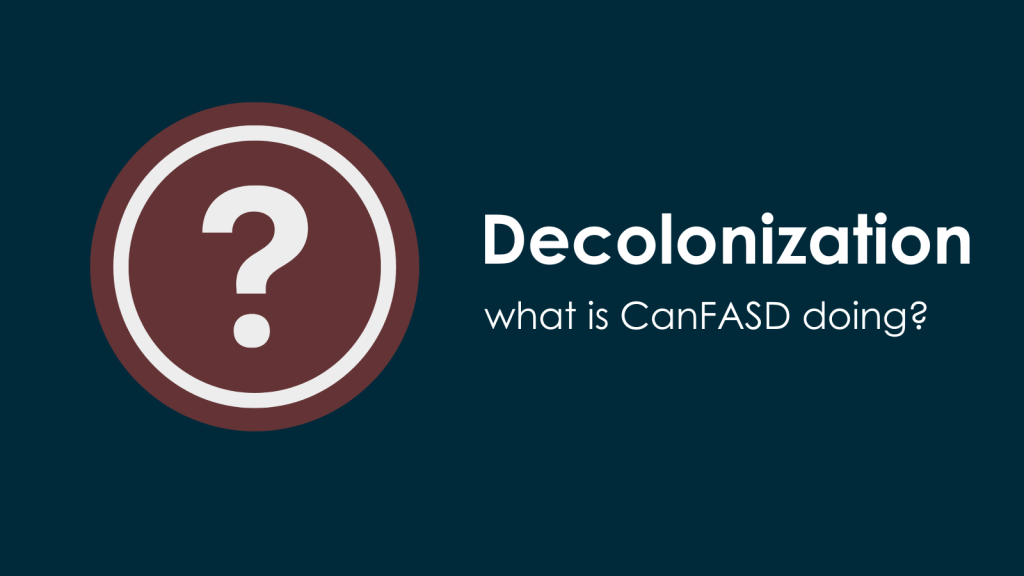Increasing our capacity to support reconciliation and Indigenous-led research is a key priority for CanFASD.
This month’s roundtable meeting saw our team gather to unpack the topic of decolonization. The meeting included our Board of Directors, Staff, Research Leads, Family Advisory Committee and Adults with FASD Expert Collaboration Team.
Led by Dr. Melissa Tremblay, CanFASD’s Indigenous Liaison, we considered what decolonization means and brainstormed how CanFASD can continue evolving.
What is decolonization?
In short, colonialism refers to “ongoing acts that relate systemically to one another to produce difference and hierarchy” (Chan and Michandani, 2002, p.13).
In terms of research and colonialism, Dr. Tremblay explained that the pursuit of knowledge is embedded in multiple layers of colonial practices. To decolonize we need to rethink many of the ways we do research.
What can we do?
Dr. Tremblay shared preliminary findings from a study on decolonizing approaches to research at the University of Alberta, highlighting three different kinds of changes that are needed when taking a decolonial approach. These are through shifting values and commitments, unsettling knowledge and research practices and changing institutional policies and practices.
CanFASD can shift our values and commitments by taking steps to prioritize relational approaches to research. We need to value Indigenous ways of knowing and doing and valuing the time it takes to build relationships. EuroWestern academic researchers have traditionally prioritized the pursuit of knowledge over the pursuit of relationships. Although rich diversity exists between and among Indigenous communities and cultures, there is a general indigenous worldview that knowledge is always relational, not something to be owned, so to decolonize we need to focus on connection.
Decolonization means centering indigenous voices in our work. Seeking direction from diverse Indigenous communities and creating spaces for learning and empowerment are ways to unsettle established research practices. Additionally, we can elevate research practices informed by anti-racist and anti-sexist approaches.
CanFASD can make changes to our institutional policies and practices by supporting more Indigenous and decolonial scholars. We can also require leadership to be more engaged in their own learning about decolonization.
CanFASD and decolonization
In small breakout groups we discussed these points further and brainstormed how CanFASD could do better in these areas. Using our different experiences as staff, directors, research leads and committee members we were able to come up with ways in which we can implement the ideas shared and generated at our roundtable. We looked at things we can do that are specific to our own individual work, as well as at an organizational level.
Notes were taken in each breakout session which will be used in a report to guide our future work. These ideas will influence how we carry out ongoing and future research projects, the resources we share and the policies we advocate for. In the discussions it was noted that CanFASD has undertaken many steps to address decolonization and can always do and learn more.
Conclusion
The above are just a few of the ideas we discussed in our roundtable meeting. CanFASD has developed an analysis and responses to the related sections of the Truth and Reconciliation Commission (TRC) calls to action and an inventory of the actions taken across the relevant sectors – Intersection of the TRC Calls to Action and Fetal Alcohol Spectrum Disorder. The principles of the TRC will continue to provide a critical foundation in guiding the work of CanFASD.
While decolonization is difficult to define, we are committed to making changes and will provide regular updates on the progress we make. Thank you Dr. Tremblay for leading this insightful and thought-provoking conversation.
